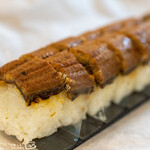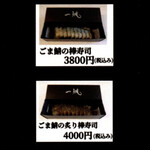
赤坂 さばの棒寿司 一颯
Akasaka sabanobouzushi IBUKI ◆ IBUKI
3.05
Akasaka
「Sushi」
--
--
Opening hours: 11:00 - 20:00
Rest time: Sundays and holidays Business hours and holidays are subject to change, so please check with the store before visiting.
東京都港区赤坂2-13-23 富谷ビル 2F
Photos
(13)













Details
Reservation Info
can be reserved
Payment Method
Credit cards accepted
Electronic Money Accepted
Private Dining Rooms
None
Parking
None
Comments
(6)
フードブロガー アカヌマカズヤ
3.50
I have also bought stick sushi as a souvenir before, but on this day, I couldn't resist purchasing various kinds of bara chirashi being sold on the street. It was an eel bara chirashi. I wish there was a bit more eel in it, but when I tried it, the shiitake mushrooms and bamboo shoots were delicious. The eel and steamed types were soft and flavorful. For 1000 yen flat, I was completely satisfied! Depending on the timing, you can find them being sold near the storefront (1F, next to the tobacco shop).



やっぱりモツが好き
3.30
Opened on July 25, 2022, this takeout-only sushi restaurant specializes in stick sushi. According to "Minna no Keizai Shimbun," the owner, Hiroshi Takahashi, trained at a sushi restaurant and then ran a Japanese restaurant in Kanazawa Bunko for 20 years. He is particular about using mackerel from Sajima, Kanagawa (either Gomasaba or Masaba), and in October, they also offered extra-large Masaba from Hokkaido as the Sajima Masaba was still small. They use a blend of Yamagata-produced Tsubaki rice blended by a rice master for the vinegar rice. The eel stick sushi (4,800 yen), premium sesame mackerel stick sushi (4,800 yen), and extra-large Pacific saury stick sushi (6,800 yen) are some of the offerings. The eel stick sushi uses domestically farmed eel (on this day, from Kagoshima) that is lightly grilled to a sweet and savory finish. While it may seem pricey at 4,800 yen, it stands out from the Chinese eel with its high-quality ingredients. It is recommended to slightly warm it up before eating to fully enjoy the eel's flavor. However, unknowing customers often mistake it for "delicious conger eel," due to its sweet and savory taste. The sesame mackerel stick sushi (4,800 yen) and extra-large Pacific saury stick sushi (6,800 yen) are also available. The former uses Sajima mackerel while the latter uses Hokkaido Masaba, a premium fish weighing 1 kilogram each. The stick sushi tends to have a stronger vinegar taste compared to eating it fresh at the restaurant. It has a shelf life of 4 days without deterioration (though the expiration date is the next day), but the taste may slightly diminish due to increased shelf life. Overall, it makes for a delicious souvenir with its strong vinegar flavor, especially the fatty Masaba which the author prefers. Each slice is individually wrapped in an antibacterial film, possibly for Anisakis prevention, and undergoes instant freezing. The packaging in white paper and a black box, along with a black-themed paper bag, exudes a sense of luxury. Compared to sushi from department store basements in Tokyo, this is a much better option as a gift. The 6,800 yen for the Masaba may seem high, but it is reasonable considering the quality. In the author's opinion, it is even tastier than the premium "Ginsen" from Kyoto's established sushi restaurant, Hanaore, purchased for 6,480 yen. In Tokyo, where stick sushi culture is not as prevalent as in Kyoto, hidden gems like this restaurant can be found.




a8902476643
3.10

ZDM1000R
3.30
At lunchtime, this place also sells seafood bowls and bento boxes using mackerel, but when I visited around 2:00 PM, only display stands were left and it was already too late. "Akasaka Sabanobousushi Ichisou" When I climbed the stairs and entered the entrance on the second floor, I was told by a woman in a kimono to buy mackerel stick sushi. Shonan Sajima's premium sesame mackerel stick sushi; 4800 yen vacuum packed, with a consumption period of 2-3 days. Actually, there is a place nearby selling mackerel pressed sushi for 350 yen, which is so delicious that it has become famous, so I bought it for comparison. The rice part has yukari in it, and the mackerel itself has thick flesh and is skillfully prepared with a hidden knife. Also, a thin sheet of kelp is attached to the surface to eliminate the fishy smell of the mackerel. I will purchase from there as well and compare the taste, but there is no way the goodness can justify a 15-fold price difference.




S.t0206
2.90
I didn't order the sabazushi, but I happened to try the chirashizushi takeout. I have tried the sabazushi from their regular menu before, but the chirashizushi had a different deliciousness. The contrast between the colorful appearance and the simple taste was very interesting. It had a good volume, perfect for a gift. Initially, it was limited, but now it seems to be available for sale more often, and the price is reasonable. I recommend trying it at least once.

マサ2000
4.50
I have been curious about this takeout lunch place for a while. They do a thorough job and everything I tried was delicious. The eel must be domestic, as it is tender and has no unpleasant smell. And all of this for only 1000 yen is too good of a deal!

Email Login